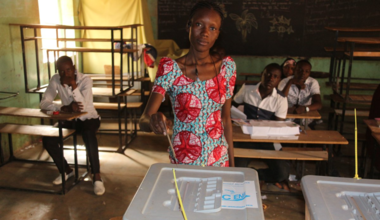Security Council Press Statement on Guinea-Bissau
13 December 2012 - The members of the Security Council held consultations on Guinea-Bissau on 11 December 2012, with the participation of Joseph Mutaboba, Special Representative of the Secretary General and Head of the United Nations Integrated Peacebuilding Office in Guinea-Bissau (UNIOGBIS). The Permanent Representative of Morocco, in his capacity as Chair of the Committee established pursuant to UNSC Resolution 2048, also briefed Council member on the activities of the Committee.
The members of the Security Council recalled Resolution 2048 (2012) and restated their demands for the full restoration of constitutional order in Guinea-Bissau.
The members of the Security Council condemned the armed attacks at the Bissalanca Air Force Base in Bissau on 21 October and expressed deep concern over the reports of killings and serious human rights violations, as well as of continued restrictions on freedom of assembly, opinion and information in the aftermath of those attacks. They further expressed concern over reports of threats and intimidation acts against UN personnel, reaffirmed the need to ensure the safety and security of UN personnel and demanded that UNIOGBIS is allowed to fulfil its mandate, in accordance with relevant UN Security Council Resolutions. They further demanded that these events be fully investigated and their perpetrators be brought to justice.
The members of the Security Council expressed serious concern over the lack of progress in the restoration of constitutional order in Guinea-Bissau and noted that stabilisation can only be achieved through a consensual, inclusive and nationally-owned transition process, based on genuine dialogue and effective civilian oversight over the military. In this context, the members of the Security Council welcomed the opening of the 2012-2013 session of the National Assembly as a first step towards an inclusive political process and await its agreement on a clear and credible timetable for the organization of free, fair and transparent presidential and legislative elections, in line with national legislation and international standards. They encouraged ECOWAS and the CPLP, in collaboration with the United Nations, the African Union and the European Union, to support this political process.
The members of the Security Council also expressed serious concern over reports of increase in drug trafficking since the 12 April coup and urged the civilian and military leadership in Guinea-Bissau to demonstrate greater commitment to international efforts to combat drug trafficking, by ensuring the full functioning of state agencies responsible for border control and for combating drug trafficking. The members of the Security Council stated their willingness to consider ways of ensuring the collection of additional data on the identity and activities of those involved in drug trafficking and organised crime in Guinea-Bissau.
The members of the Security Council reaffirmed the importance of coordination of international efforts to address the crisis in Guinea-Bissau and, in that context, welcomed the decision of the UN, AU, ECOWAS, CPLP and the EU to send a joint assessment mission to Guinea-Bissau during the current month of December to assess the political and security situation and facilitate the formulation of recommendations on how best these organizations can work together to assist Guinea-Bissau in a number of key areas for long-term stability, including the reform of the security sector, the promotion and respect for rule of law, the creation of an enabling environment for the enhanced control over the security forces, the fight against impunity and the fight against drug-trafficking and the promotion of social-economic development.
The members of the Security Council expressed their gratitude for the work of SRSG Joseph Mutaboba for the past four years. They further expressed their commitment to continue to follow closely the situation in Guinea-Bissau.
 UN
UN




